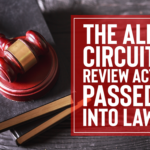False Claims Act
We’ve all heard stories of unscrupulous contractors, companies and individuals who rip off their fellow taxpayers by defrauding the government through fraudulent claims or contracts. These dishonest actions enrich the few at the expense of the workers and families whose taxes fund our government and unfairly punish the honest companies and individuals who play by the rules. This kind of corruption undermines the level playing field on which our free market operates, is an enormous drain on our national resources, weakens our economy and diminishes our country’s status in the world.
If you have personal knowledge of fraudulent activity directed at the U.S. government or state governments, whether at your own place of employment or another’s, the law empowers you to bring the wrongdoing to light in a court of law and will reward you with a significant portion of the funds that the government recovers. The federal False Claims Act (as well as state false claims acts) allows individual whistleblowers to pursue “qui tam” cases against corrupt entities by filing sealed allegations of fraud based on the whistleblower’s private knowledge of wrongdoing. The Department of Justice is required to review your allegations and decide whether to intervene in the case. When the Department of Justice intervenes and obtains a financial recovery, the whistleblowers, or “relators” as they are called, are entitled to receive a 15-25% share of the funds recovered.
Being a whistleblower can feel like David taking on Goliath. We help level the playing field.
Bringing a qui tam claim
Bringing a qui tam claim requires persistence, patience, and courage. The process includes some safeguards to protect the whistleblower as the case progresses. Working with an experienced False Claims Act attorney will help provide the whistleblower with the maximum protection possible.
Typically, a whistleblower is an insider with solid evidence of his or her employer’s wrongdoing. Whistleblowers have a tremendous sense of integrity and concern for the public good. The whistleblower who contacts a False Claims Act attorney will be able to provide confidential information about the fraud without his or her employer’s knowledge. At Kreindler & Associates, we are particularly sensitive to confidentiality issues and treat all information received from clients and potential clients with great care to preserve the confidentiality under which it was provided. During our evaluation of your allegations, our communications are, by law, regarded as privileged and confidential. Our commitment and obligation to maintain such confidentiality extends to all cases we consider, including those for which we are not retained.
An experienced False Claims Act attorney works with a whistleblower to collect, analyze and organize all evidence of wrongdoing, researches legal aspects of the fraud and, if warranted, files a sealed False Claims Act complaint in federal court and provides evidence of the fraud to Department of Justice. The employer will not receive a copy of the complaint or be notified of its contents while the case is pending under seal.
The Department of Justice, guided by suggestions from the whistleblower and his or her attorney, investigates the allegations and may request evidence from the alleged wrongdoer, eventually deciding whether to intervene in the case. If the Department of Justice does not intervene, the whistleblower and his or her attorney can still pursue the claim, although the process will be more difficult and the chance of recovery lower.
The general timeline for a successful qui tam case can be lengthy – three to five years, on average – but the recoveries can be huge and the benefit to the public by fighting corruption can be priceless.



